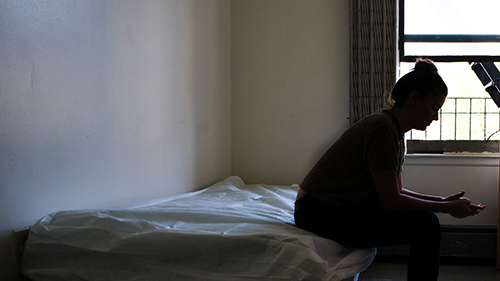Alyssa interned with Sanctuary over the summer and is currently a student at Holy Cross.
—
Over the past few years, sexual assault, rape, and intimate partner violence (IPV) on college campuses have become widely-discussed topics, especially for young people. College students, parents, and people of all ages have raised their voices in disdain over the way schools handle or mishandle cases of campus sexual assault. The issue most recently came to a head in September when Secretary of Education Betsy DeVos rescinded the ‘Dear Colleague’ letter, an Obama-era letter of guidance to universities across the country on how to investigate cases of sexual assault and better protect the rights of survivors.
According to the Rape, Abuse, & Incest National Network (RAINN), “Among undergraduate students, 23.1% of females and 5.4% of males experience rape or sexual assault through physical force, violence, or incapacitation.” These are staggering numbers. Unfortunately the issue is perpetuated by backward and often misogynistic and discriminatory attitudes towards victims. Phrases like “boys will be boys” and “s/he was asking for it” are still all too common, making it painfully difficult for both women and men to reach out for the help they deserve and need.
Countless organizations have been established in the name of awareness and preventative efforts against sexual assault and IPV, including former Vice President Joe Biden’s “It’s On Us” Campaign and the One Love Foundation. During my time here at Sanctuary for Families, I came to learn that this non-profit puts forth its own kind of effort to help survivors. I was given the opportunity to talk to one of the women who heads this initiative, Rebecca Zipkin.
The Campus Gender Violence Initiative
Sanctuary’s concern with campus sexual assault grew as the nation’s concern with it grew. Lauren Hersh—former Director of Anti-Trafficking Advocacy and Policy and Sanctuary—and Legal Center Director Dorchen Leidholdt noticed that there was no legal assistance readily available for student survivors and decided that Sanctuary should do something about it. It was from this need that Sanctuary developed the Campus Gender Violence Initiative to provide resources to students in cases of campus sexual assault at universities across New York City.
Zipkin, who works alongside staff attorney Alexi Meyers, said that it is rare for student survivors to attain a lawyer for their case. This is why Zipkin and Meyers want student survivors to know that they deserve resources and that places like Sanctuary are able to provide them.
Sanctuary’s Campus Gender Violence Initiative began with a pilot program at Columbia University, through which Sanctuary staff attorneys would counsel and guide students through the campus disciplinary hearing process when bringing sexual assault allegations against other students. Under a federal grant, Sanctuary is now in the planning phase to expand this work to other schools in the New York area, in collaboration with the New York City Alliance Against Sexual Assault. Known as the Campus Advocates Project, this pilot will train and mentor law students to advocate on behalf of sexual assault survivors in university disciplinary hearings, a model pioneered by Sanctuary through its now 20-year-old Courtroom Advocates Project based in Family Court. The Campus Advocates Project will be training 25 New York based law students in the coming fall.
The Need
So far, Sanctuary’s Campus Gender Violence Initiative has assisted over 30 survivors and according to Zipkin, “We have just finished two cases that resulted in the expulsion of the perpetrators, which is very unusual, so we consider that very successful.”
Like Alexi and Rebecca, there are countless people who dedicate their work and their time to raising awareness of sexual violence; but there is still more to be done. According to the National Alliance to End Sexual Violence, women of color are at the greatest risk for violence. Zipkin agrees that this is the case,
“We have actually seen that the vast majority of our clients are people of color, foreign-born people, [and] young women who would not be able to afford a lawyer otherwise.”
On the other hand, most of the perpetrators do have private attorneys, often paid for by the parents. This leaves survivors at a disadvantage, especially those who are not able to obtain a lawyer at all.
Zipkin also points out that since this issue is primarily referred to as “campus” sexual assault, it ultimately makes people think that it is a “less serious crime or something that just happens at college when two kids get too drunk.” This, of course, is far from the reality: “It’s rape. It’s rape whether it happens at college or whether it happens one year after college at work, or forty years after college. It doesn’t matter where you are or who you are, it’s all the same,” says Zipkin.
Prevention
The best way to ensure preventative measures are being taken, according to Zipkin, is to advocate for more education. Most young people don’t learn about sexual violence until the first few weeks of college when they go through orientation. Even after that, most students never hear or talk about it again. This lack of knowledge is not only detrimental, it is unfair to young people.
The best way to prevent sex crimes from occurring is to adamantly teach people from a young age how wrong it is. Just as it is ingrained in society that murder is wrong, sexual and gender violence should not be tolerated. Our culture must change..
Due to the current sociopolitical climate and the changes that Secretary of Education Betsy DeVos is making to Title IX policies, students and survivors everywhere are on the edge. In response to these uncertain times, Zipkin says,
“I am hopeful that because of the student advocacy and how empowered students have been—especially student survivors—and the demands that they are making on their schools that no matter what [the administration] does, these schools will not roll back these protections. In the end, they are serving the students.”
